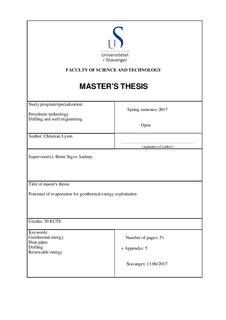| dc.contributor.advisor | Aadnøy, Bernt Sigve | |
| dc.contributor.author | Lysen, Christian | |
| dc.coverage.spatial | Norway | nb_NO |
| dc.date.accessioned | 2017-10-26T13:57:08Z | |
| dc.date.available | 2017-10-26T13:57:08Z | |
| dc.date.issued | 2017-06-13 | |
| dc.identifier.uri | http://hdl.handle.net/11250/2462428 | |
| dc.description | Master's thesis in Petroleum engineering | nb_NO |
| dc.description.abstract | This master thesis investigates the potential of using heat pipes as geothermal heating systems for domestic purposes. The total electric energy consumption in Norway used for heating purposes is estimated to be as much as 100 TWh a year. This means that successful implementation of a new energy system would not only save money for the consumer, but also provide relief to the existing power grids. To examine the possibility of using heat pipes, a case study is performed based on available models and theory adapted for a Norwegian environment. The system is considered as an array of thermal resistances which control how much heat that is possible to extract from the ground. The energy that is extracted represents a cashflow which makes it possible to investigate the profitability of the system designed in the case. The case study shows that when drilling an 800 meter well, 86 250 kWh of heat is possible to extract when utilizing a heat pipe system with ammonia as working fluid. The system can supply 4 houses with heat equivalent to what average households use in terms of electric heating. The economic analysis of the system shows that the system is profitable with a net present value of 331 077 NOK. The minimum depth for this system to show profitability is found to be at approximately 300 meters depth. Though the base case shows profitability, projects like this are highly sensitive to costs related to drilling and selection of materials. The models that are applied do not take into consideration important issues regarding heat pipe operations which add uncertainty to the production numbers. The projects are therefore likely to be economically marginal without any governmental support. The findings in this thesis are still interesting enough to investigate further and develop better models to better understand the working potential of heat pipes as geothermal energy extractors. | nb_NO |
| dc.language.iso | eng | nb_NO |
| dc.publisher | University of Stavanger, Norway | nb_NO |
| dc.relation.ispartofseries | Masteroppgave/UIS-TN-IPT/2017; | |
| dc.subject | petroleumsteknologi | nb_NO |
| dc.subject | petroleum engineering | nb_NO |
| dc.subject | boreteknologi | nb_NO |
| dc.subject | well engineering | nb_NO |
| dc.title | Potential of evaporation for geothermal energy exploitation | nb_NO |
| dc.type | Master thesis | nb_NO |
| dc.subject.nsi | VDP::Technology: 500::Rock and petroleum disciplines: 510::Petroleum engineering: 512 | nb_NO |
